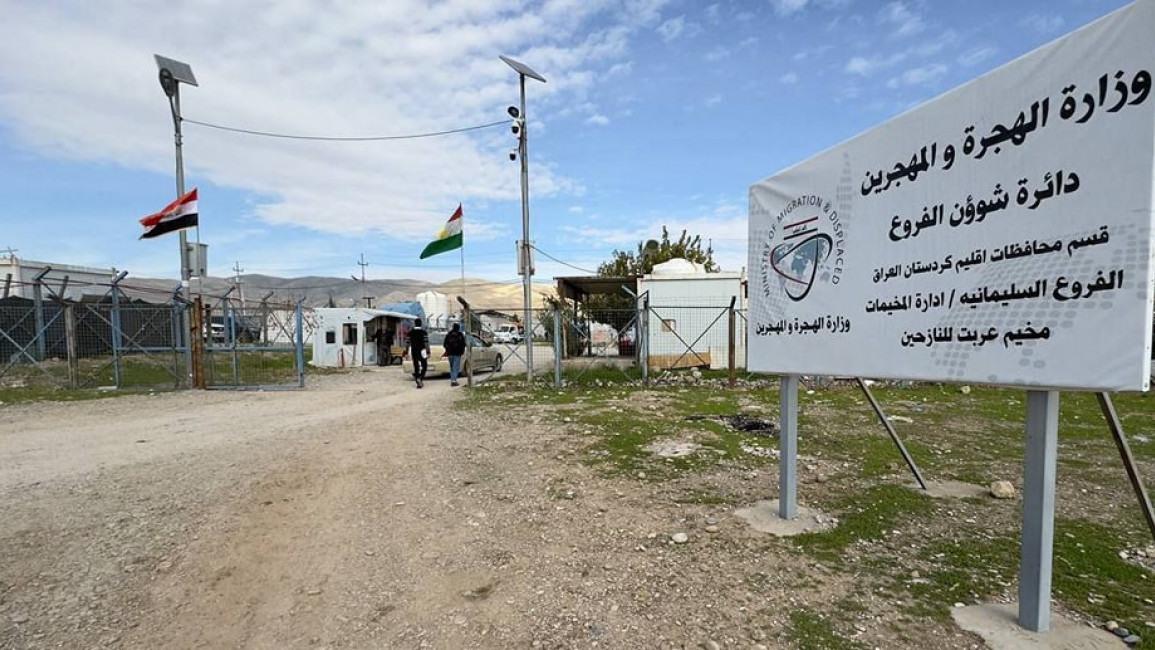'Insufficient funds' forces IDP camp in Iraqi Kurdistan to close down
The second biggest camp hosting Iraqi Internally Displaced Persons (IDPs) in Iraqi Kurdistan's Sulaimaniyah province was closed due to the lack of international and local funds.
Iraq's Ministry of Migration, through a Facebook statement, has declared the closure of the Arbat Internally Displaced Persons (IDP) camp. This decision comes after the last group of families returned to their homes in Salahaddin province.
Iraq's Ministry of Migration, on 14 December, in a statement, declared the closure of the Arbat Internally Displaced Persons (IDP) camp. This decision comes after the last group of families returned to their homes in Salahaddin province.
"Minister of Migration and Displaced, Ivan Faik Jabro, expressed gratitude in a statement to the local government in Sulaymaniyah for their cooperation in implementing the federal government's plan to facilitate the return of displaced people to their homes and the closure of camps," read the statement.
Closure of Qurto camp in Sulaymaniyah, as first camp to be closed in Iraqi Kurdistan Region IKR since 2014 displacement, Minister of Immigration & Displacement.
— KirkukNow (@Kirkuknow_DT) November 17, 2023
She thanked local government for cooperation in implementing federal government’s plan to facilitate return of IDPs. pic.twitter.com/dKXRU8Csmi
Jabro also urged the local governments in Erbil and Duhok to follow Sulaymaniyah's lead in facilitating the return of displaced people according to the government's plan to end displacement and close camps.
"Arbat camp has been closed because funds from the United Nations and the Iraqi federal government have been reduced, Daban Mohammed, mayor of the Arbat sub-district of Sulaimaniyah, told The New Arab in a short interview. "The step aims at better running the camps by the Kurdistan Regional Government and local administrations."
He dismissed allegations that the IDPs, including displaced Yazidis from Sinjar and displaced Syrians, were "forcibly" evacuated.
However, sources from inside the camp told Al-Araby Al-Jadeed, TNA's sister website in Arabic, that the displaced people were forced to leave after information emerged about the expiration of the lease agreement between the camp's landowner and the Iraqi Ministry of Migration.
"Some displaced families headed to Sulaymaniyah city despite having no money, while others set up tents on the slopes of hills. Some moved to the nearby Ashti Camp," the sources added.
The sources also noted that most of the displaced in the Arbat camp are from the Yathrib area in Salah al-Din province, controlled by armed factions within the Iraqi Popular Mobilization Forces (PMS). These factions seized the homes of displaced Iraqis, leading them to choose Ashti Camp after the closure of Arbat, causing overcrowding due to the smaller space in Ashti compared to Arbat.
Baghdad is aiming to shut down all internally displaced persons (IDP) camps in the country, with Jabro announcing in December 2022 that all camps would be closed within six months. However, human rights advocates have raised concerns, emphasising that individuals should not be compelled to leave the camps, and any returns must be voluntary.
Despite the federal ministry's announcement of the closure of the Qoratu IDP camp near Khanaqin district last month, local authorities have denied this claim.
Jabro attributed the return of families to their homes to directives from Iraqi Prime Minister Mohammed Shia al-Sudani to address the displacement issue in the country.
According to statistics from the Kurdistan Regional Government's (KRG) Joint Crisis Coordination Center, the Kurdistan Region is currently hosting over 640,000 displaced Iraqis, primarily residing in camps across the region's four provinces.
However, reluctance to return to hometowns persists due to ongoing threats by Iraqi Shiite militias, insufficient reconstruction efforts, and a lack of essential services. Some individuals who initially left the camps voluntarily to rebuild their homes and livelihoods have been compelled to return, unable to secure the essentials for a sustainable life.



